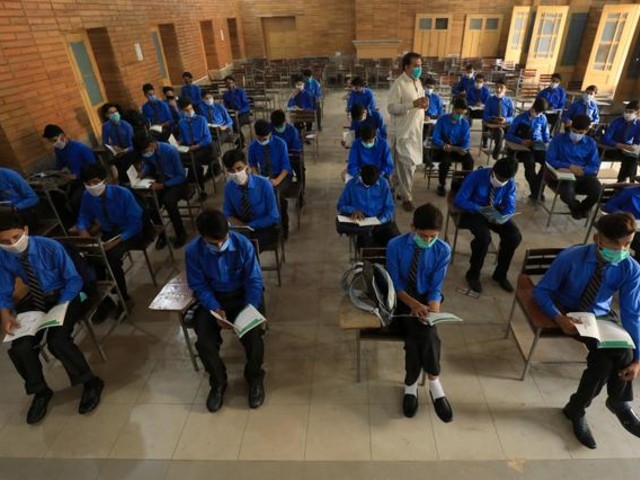
Matric and intermediate exams were suspended this year due to the coronavirus pandemic, and with students promoted on the basis of average marks or a percentage increase depending on past performance, the pass rate in Sindh was far higher than usual.
On surface, this appears to be a much-needed positive. But the higher success rate for matric students has highlighted the limited number of seats available at public colleges, as well as the lack of resources at their disposal.
Subsequently, thousands of students - even after passing - find their college plans in jeopardy.
Over 99 per cent of students in the science group passed their matric exams causing difficulty for the admission process for science programmes in public and private colleges.
According to data obtained by The Express Tribune from the Board of Secondary Education, Karachi, approximately 67,000 more students cleared their matric exams this year as compared to last year, as a result of the temporary promotion policy put in place amid the six-month closure of educational institutions.
Last year, the number of matriculating students in the science and general group matric exams was 123,813. But this year, a stupendous 191,191 students cleared their exams - most of them with only C, D and E grades.
A total of 100,280 students passed with C, D and E grades under the promotion policy this year, as opposed to only 39,498 students who matriculated with these grades the previous year.
This proportion of students with low passing grades - who appear to form the majority of the 'excess' graduates - has thrown a wrench into the admission process in colleges, particularly in the science subjects.
The number of seats available for first year students in over 250 government colleges and some secondary schools in Karachi is 116,000. Of the 123,813 students who matriculated last year, over 90,000 students enrolled in the said institutions.
Meanwhile, out of the remaining students, around 33,000 in number, some went to private colleges and some did not enrol in college at all.
This year, however, there are 116,000 seats in government colleges and 191,191 students qualified to apply.
If the majority of the students with the lower grades apply for admission in pre-engineering or pre-medical subjects, colleges will not have enough laboratories or enough equipment or faculty.
Meanwhile, one college professor raised questions at the qualifications of the students. "Do the students who passed under the promotion policy with C, D or E grades have the capacity to study science pre-engineering and pre-medical subjects at the intermediate level?" he asked, speaking to The Express Tribune.
There is no policy regarding this at the college level, he complained. According to him, the officials of the provincial college education department are indifferent to this.
As for the higher grades, the number of additional students, in comparison to last year, matriculating with A1, A or B grades this year was far lower than those passing with C, D or E grades. Only 1,405 'extra' students have passed with A1 grades, 469 with A grades and 2,675 with B grades.
Published in The Express Tribune, October 6th, 2020.


1727661121-0/Kris-Kristofferson-(1)1727661121-0-165x106.webp)

1726739452-0/Express-Tribune-Web-(10)1726739452-0-165x106.webp)
1727242355-0/Diddy-(1)1727242355-0-165x106.webp)
1725254039-0/Untitled-design-(24)1725254039-0-270x192.webp)










1727268465-0/Untitled-design-(42)1727268465-0-270x192.webp)
COMMENTS
Comments are moderated and generally will be posted if they are on-topic and not abusive.
For more information, please see our Comments FAQ